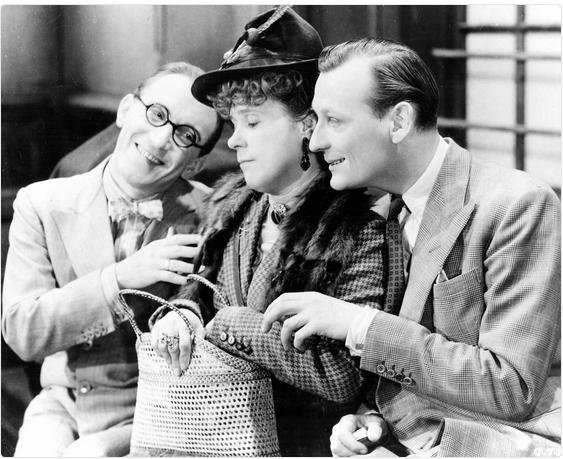
The Ghost Train (1941)
“They do say that to look on the ghost train would mean death...”
Ah, Music Hall. A form of entertainment which is completely and utterly unfathomable to anyone born after 1955, and which (one hopes) most people with taste found hateful even before that date. A pair of pillocks in daft hats and overcoats singing “Underneath the arches”. Women with feathers in their hats conducting Cockernee singalongs. Arthur fucking Askey.
If, as a modern viewer, you don’t think you find Arthur “Ithankyew” Askey particularly irritating, then it is possible to remedy that view quite quickly. The Ghost Train acts as a crash course in just how annoying the little twat could be.
In the man’s defence, it does appear that he’s playing a character who’s supposed to be that annoying, but he really is good at it. And the viewer has to admire the guts of a “star” who is willing to be the lead in a film which portrays him as such a tosser – by the end of the film you really are hoping that something nasty will happen to the little buffoon (as, by the look of it, are the rest of the cast).
Luckily, Askey aside, The Ghost Train is an effective horror film, with moments of genuine creepiness and a suspenseful premise – rare for a wartime offering, due to the supposed “moratorium” imposed on horror films which led to them being “snuck out” under the comedy / whimsy / Askey banner. And of course, if it wasn’t for Askey’s character’s utter selfishness, the whole film wouldn’t have happened - the unfortunate predicament of the disparate group who find themselves stranded in a supposedly haunted railway station is all down to Askey’s character Tommy Gander pulling the communication chord after losing his “titfer” out the window (“It was you who stopped the train!” / “Yes, I don’t know me own strength!”).
Gander and his friend (regular partner Richard “Stinker” Murdoch) have been lamely trying to pick up girls on the train before this unforeseen delay sees their ride arrive too late for the connection, which hasn’t enamoured either of them to the girls or the various handy-looking men who have been quick to step up to protect their honour. Once stranded on the platform of the station, everyone is quick to take out their frustration on the man responsible (“the next time you drop your hat out of the window, I hope you forget to take it orf”), but Gander seems utterly immune to any of the stiff-upper-lipped attacks, even when one large angry fellow passenger echoes the thoughts of the audience with: “To think we’ve got to put up with that little squirt for the next eight hours!”
As a storm approaches, the stationmaster tells the group that he won’t let them stay on the station alone, but that he won’t stay with them either. “Anyone would think from the way you go on that the place was haunted,” laughs one woman passenger. “It is haunted,” he replies sagely, prompting Gander to walk about with his arms outstretched, mummy-style.
The stationmaster tells a tale of 43 years ago, when the then stationmaster died from heart failure as he was half way through closing the swing bridge nearby. The next train crashed, killing the occupants. The line hasn’t been used since, but on some nights the train can still be heard… “They do say that to look on the ghost train would mean death,” he adds, less than cheerily.
After this bit of news, the group convince the stationmaster that they have to stay, and Gander tries to cheer them all up with a song (his record player, being used to accompany his inane warbling, gets unceremoniously dumped on the rail tracks). He goes to light the gas in the kitchen. It explodes (“It’s alright everybody, that was the tea urn. I just ‘tea-urned’ the gas on. I’ll have to take that out of the joke book…”). He spends a good five minutes pretending to step over the invisible body of the stationmaster. He’s basically intent on winding everyone up (I lost count of the amount of fists he had brandished in his direction, and the train guard’s reaction to his high-jinks is the first and only time I’ve ever heard the word “Gertcha!” used seriously in anger).
There follows a genuine moment of suspense, as the now jittery (and annoyed) group hear something coming down the platform towards them. It turns out to be the stationmaster, who promptly drops down dead of a heart attack, his body then mysteriously disappearing. Another couple turn up at the station – Julia, who seems rather highly strung, and her brother, who has just crashed his car nearby. Julia, who claims she can see the ghost of the old stationmaster, now starts racking up the tension with considerable panache, and suddenly the lights go out, plunging everyone into shadow. The platform bell begins to ring, and there’s the sound of a train approaching, which gets louder and louder, the lights from it streaming through the windows of the waiting room. Julia smashes the glass to get a look, screams and collapses.
This highly effective bit of supernatural jiggery-pokery almost banishes memories of Askey from our minds, but he’s still there (sadly) as the story resolves itself into a bit of wartime propaganda with lots of fifth columnists getting shot.
If you can get past the inclusion of Askey (and it’s a big “if”), The Ghost Train is a very effective little film. Everyone else is playing it dead straight, which makes the ghostly goings-on work very well indeed.
